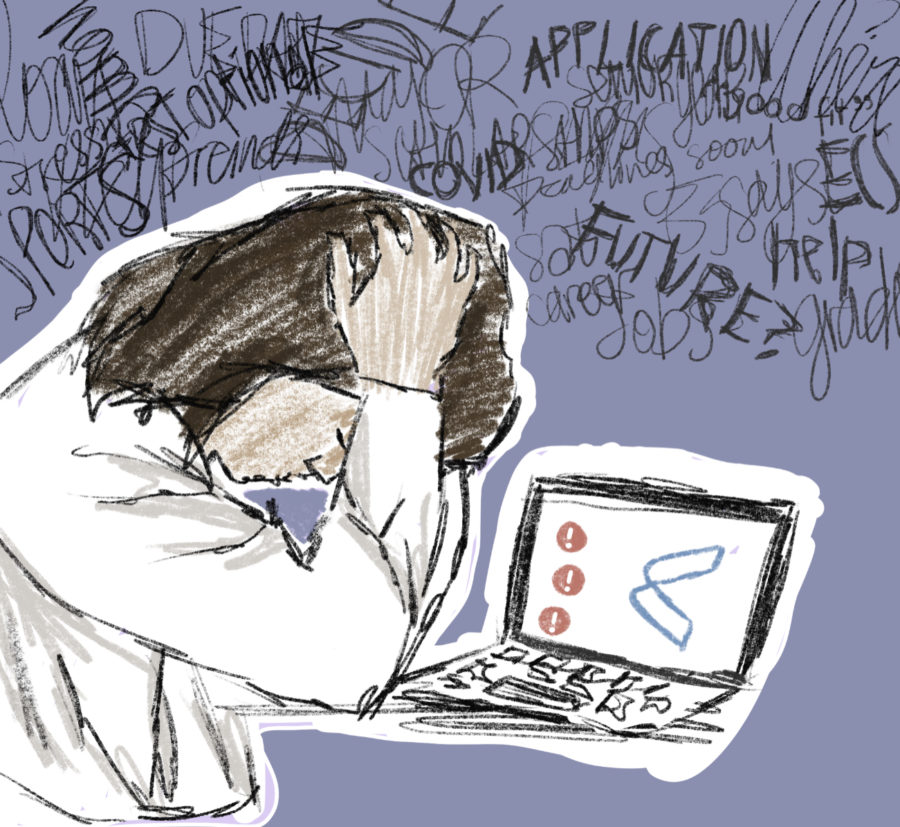Opinion | ETHS culture and post-secondary planning
After a year and a half with e-learning, it felt bizarre to step back into the building and tackle in-person learning again. Simultaneously working through the college application process while also taking classes in person left me and many others submerged in stress. Although this stress is to be expected at this pivotal moment of our lives, the environment at ETHS and the pressure of attending college quickly becomes a large weight on students’ shoulders.
At a successful institution at ETHS, it’s not hard to feel a great amount of pressure to take vigorous classes or apply to college. In an environment with so many students and a great number of success stories, ETHS makes it easy to compare yourself to your peers or feel inadequate if you lack in these areas. This is the reality in many high schools, especially when it comes to post-high school planning.
As soon as freshman year, you’re planning out what you want to do with your future; this expectation is placed on you by peers, teachers, and counselors. This high influence on post-high school life takes away from the present and can cause many to solely focus on the future. And while this may motivate some, it leaves others with a lot of unnecessary stress not needed at 14 years old.
“Honestly, I believe that when I talk to other individuals there’s always a pressure to have to take as many AP classes as you can, to get a perfect A, and all for the reason that it will prove that you are intellectually above everyone else. These academic cultures have created an extra pressure on students to feel like they can’t fail, to be afraid of anything less than an A, it ultimately ruins the enjoyment of learning. It creates the mindset that going to class is only about getting a 100%, it makes us as students feel like our transcripts, our grades, are what determine our success and determine our identities, says Joanna Tafolla.
As college applications snuck up on me, I found myself with the tendency to compare myself to those around me, feeling like if I didn’t apply to top schools, I was somehow inadequate. ETHS has had the chance to reimagine how they would deal with seniors and their post-high school plans as they juggle classwork, college applications, jobs, and more. This window to alter the post-secondary process was aided by outside sources like test-optional and Covid-19.
In 2020, many colleges and universities opted to make their application process test-optional, meaning students were not required to submit standardized test scores. This continued into this academic year, with over 1,600 colleges and universities in the U.S. extending their test-optional policies through the 2021-22 application process.
With this part of your application, it often means taking a greater look at the other parts of a student’s application, something ETHS cares highly about. Within such a large school, a culture of trying to stand out and join an array of clubs and activities to add to your resume is bound to happen.
“Though it’s a good thing for students to push themselves academically, the competition aspect often spreads students much too thin. Coupling this with the component of applications, it can create an extremely tense, unhealthy setting that isn’t conducive to the learning environment we should be striving towards. Although the school does offer some college aid resources, I feel there should be more aid in the mental toll all this extraneous work can take,” says seniors Elyscia Dunlap.
This culture is what perpetuates the pressure to attend top-tier colleges after high school. And while ETHS is a place that houses this culture, it does make sure to provide resources for students, especially as they handle the college application process. It’s important to take advantage of your resources and the people at ETHS who are looking to help you achieve your goals. One annual event is Wildkit Futures Day, where students sign up for various events, ranging from financial aid, to navigating School Links, to First Generation Experiences. Counselor meetings helping students navigate post secondary plans are another resource, with the College and Career Center and School Links providing information to students who need it.
ETHS provides students resources that, if utilized, will help them be successful, even amongst the high pressure that has been built. All of these resources tend to happen before the Nov. 1 deadline in an attempt to prepare students for early action or early decision deadlines. But still, not everyone has the same resources needed to move past this point.
Moving forward, if ETHS is truly working to reduce the toxic academic culture, it must systematically examine how to change the academic culture, both the exclusionary and competitive aspects. Altering the culture rather than solely providing support becomes key in providing greater success within this toxic way of operating.
“From conversations I’ve had with peers, our stress has reached new levels of refractory. It’s difficult to focus on your personal growth when many downplay their successes to sound humble when it only fosters more competitiveness; and not in a constructive manner. So how do we become a student body, conducive to an environment that motivates us to learn for the sake of seeking knowledge rather than trying to outperform our peers? We start off by acknowledging that high test scores, grades, and awards should not be an emblem of our academic culture,” concludes Ruta Baraki.
Your donation will support the student journalists of the Evanstonian. We are planning a big trip to the Journalism Educators Association conference in Nashville in November 2025, and any support will go towards making that trip a reality. Contributions will appear as a charge from SNOSite. Donations are NOT tax-deductible.




